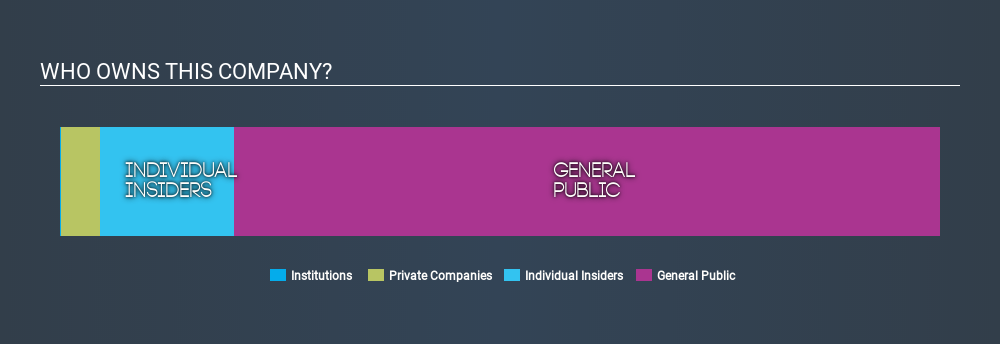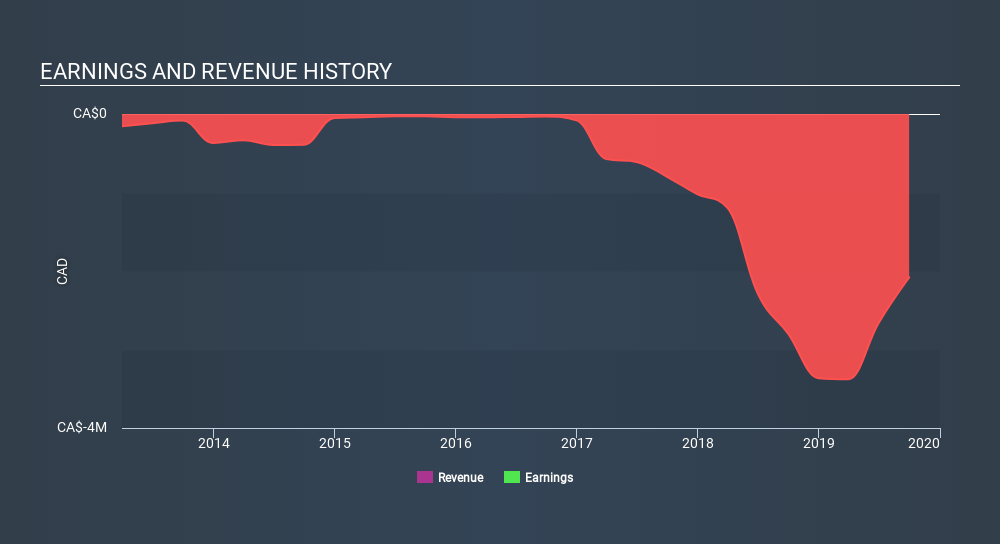- Canada
- /
- Metals and Mining
- /
- TSXV:LITH
Can We See Significant Insider Ownership On The Lithium Chile Inc. (CVE:LITH) Share Register?
A look at the shareholders of Lithium Chile Inc. (CVE:LITH) can tell us which group is most powerful. Large companies usually have institutions as shareholders, and we usually see insiders owning shares in smaller companies. Warren Buffett said that he likes 'a business with enduring competitive advantages that is run by able and owner-oriented people'. So it's nice to see some insider ownership, because it may suggest that management is owner-oriented.
With a market capitalization of CA$24m, Lithium Chile is a small cap stock, so it might not be well known by many institutional investors. In the chart below, we can see that institutions don't own shares in the company. Let's take a closer look to see what the different types of shareholder can tell us about Lithium Chile.
See our latest analysis for Lithium Chile

What Does The Lack Of Institutional Ownership Tell Us About Lithium Chile?
Small companies that are not very actively traded often lack institutional investors, but it's less common to see large companies without them.
There could be various reasons why no institutions own shares in a company. Typically, small, newly listed companies don't attract much attention from fund managers, because it would not be possible for large fund managers to build a meaningful position in the company. Alternatively, there might be something about the company that has kept institutional investors away. Lithium Chile might not have the sort of past performance institutions are looking for, or perhaps they simply have not studied the business closely.

Lithium Chile is not owned by hedge funds. Because actions speak louder than words, we consider it a good sign when insiders own a significant stake in a company. In Lithium Chile's case, its Top Key Executive, Albert Kroontje, is the largest shareholder, holding 11% of shares outstanding. The second largest shareholder with 4.4%, is Fosun International Holdings Ltd., followed by Steven Cochrane, with an ownership of 3.2%. Interestingly, Steven Cochrane is also a Member of the Board of Directors, again, indicating strong insider ownership amongst the company's top shareholders.
A deeper look at our ownership data shows that the top 7 shareholders collectively hold less than 50% of the register, suggesting a large group of small holders where no one share holder has a majority.
While it makes sense to study institutional ownership data for a company, it also makes sense to study analyst sentiments to know which way the wind is blowing. Our information suggests that there isn't any analyst coverage of the stock, so it is probably little known.
Insider Ownership Of Lithium Chile
While the precise definition of an insider can be subjective, almost everyone considers board members to be insiders. The company management answer to the board; and the latter should represent the interests of shareholders. Notably, sometimes top-level managers are on the board, themselves.
Most consider insider ownership a positive because it can indicate the board is well aligned with other shareholders. However, on some occasions too much power is concentrated within this group.
Our most recent data indicates that insiders own a reasonable proportion of Lithium Chile Inc.. Insiders own CA$3.7m worth of shares in the CA$24m company. It is great to see insiders so invested in the business. It might be worth checking if those insiders have been buying recently.
General Public Ownership
The general public, mostly retail investors, hold a substantial 80% stake in LITH, suggesting it is a fairly popular stock. This size of ownership gives retail investors collective power. They can and probably do influence decisions on executive compensation, dividend policies and proposed business acquisitions.
Private Company Ownership
We can see that Private Companies own 4.4%, of the shares on issue. Private companies may be related parties. Sometimes insiders have an interest in a public company through a holding in a private company, rather than in their own capacity as an individual. While it's hard to draw any broad stroke conclusions, it is worth noting as an area for further research.
Next Steps:
I find it very interesting to look at who exactly owns a company. But to truly gain insight, we need to consider other information, too. Take risks, for example - Lithium Chile has 5 warning signs (and 2 which are a bit concerning) we think you should know about.
Of course this may not be the best stock to buy. So take a peek at this free free list of interesting companies.
NB: Figures in this article are calculated using data from the last twelve months, which refer to the 12-month period ending on the last date of the month the financial statement is dated. This may not be consistent with full year annual report figures.
If you spot an error that warrants correction, please contact the editor at editorial-team@simplywallst.com. This article by Simply Wall St is general in nature. It does not constitute a recommendation to buy or sell any stock, and does not take account of your objectives, or your financial situation. Simply Wall St has no position in the stocks mentioned.
We aim to bring you long-term focused research analysis driven by fundamental data. Note that our analysis may not factor in the latest price-sensitive company announcements or qualitative material. Thank you for reading.
About TSXV:LITH
Lithium Chile
Engages in the acquisition and development of lithium properties in Chile and Argentina.
Imperfect balance sheet with very low risk.
Market Insights
Weekly Picks

Early mover in a fast growing industry. Likely to experience share price volatility as they scale


A case for CA$31.80 (undiluted), aka 8,616% upside from CA$0.37 (an 86 bagger!).


Moderation and Stabilisation: HOLD: Fair Price based on a 4-year Cycle is $12.08
Recently Updated Narratives


An amazing opportunity to potentially get a 100 bagger

Amazon: Why the World’s Biggest Platform Still Runs on Invisible Economics

Sunrun Stock: When the Energy Transition Collides With the Cost of Capital
Popular Narratives


MicroVision will explode future revenue by 380.37% with a vision towards success


Crazy Undervalued 42 Baggers Silver Play (Active & Running Mine)


NVDA: Expanding AI Demand Will Drive Major Data Center Investments Through 2026
Trending Discussion


